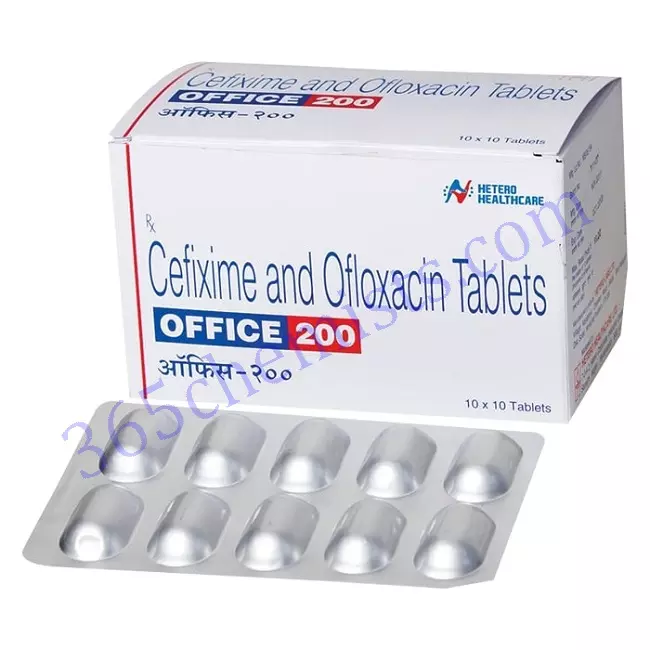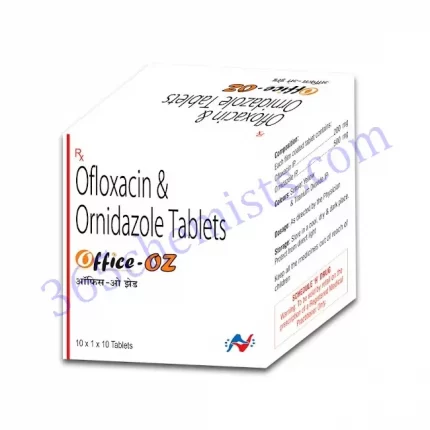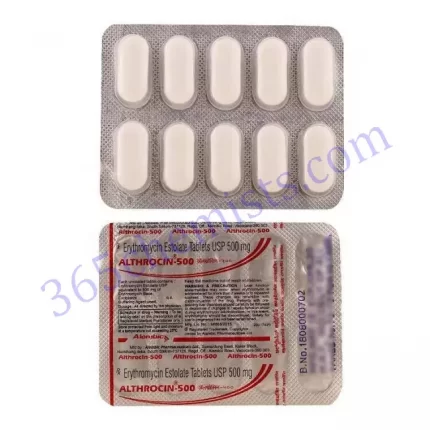Introduction:
Cefixime and ofloxacin, both in a dose of 200 milligrammes each, make up the active ingredients in the medication that is sold under the brand name Office Tablet. The use of this tablet is widespread in the medical community for the treatment of a wide variety of bacterial infections. In the following paragraphs, we will provide a comprehensive explanation of Office Tablet, which will cover its applications, recommended dosage, potential adverse effects, and essential safety considerations.
Uses of Office Tablet:
- Infections of the Respiratory Tract Office Tablet is an effective treatment for a variety of infections that can affect the respiratory tract, including bronchitis, pneumonia, sinusitis, and tonsillitis. It provides relief from the symptoms associated with these infections as well as helps combat the bacterial growth that is responsible for them.
- Infections of the Urinary Tract This medication is also employed in the treatment of infections of the urinary tract, such as cystitis and pyelonephritis. The urinary symptoms and discomfort caused by the infection are alleviated thanks to Office Tablet’s effective elimination of the bacteria responsible for causing the infection.
- Infections of the Skin and Soft Tissues: A doctor may recommend taking Office Tablet to treat infections of the skin and soft tissues, such as cellulitis, abscesses, and wound infections. It promotes healing by eliminating the bacteria that are responsible for these infections and helps eliminate the infections themselves.
Dosage and Administration:
Take Office Tablet by mouth, preferably with or without food, and only as directed by your doctor or other qualified healthcare professional. There is a possibility that the dosage will change depending on the severity of the infection, the age of the patient, and the patient’s current medical condition. Even if the symptoms improve, it is critical to continue taking the medication as directed and see the full course of treatment through to its conclusion.
Adults are advised to take one tablet twice daily, or as directed by their healthcare provider, as the typical recommended dosage. It is vitally important to carry out the treatment in exactly the way that the healthcare professional has outlined for you.
Important Precautions:
- People who have been diagnosed with an allergy to cefixime, ofloxacin, or any of the other fluoroquinolones should not take Office Tablet. Before beginning the treatment, it is essential to provide the healthcare provider with complete and accurate information regarding any known allergies or adverse reactions to medications.
- Office Tablet is not advised for use during pregnancy, particularly in the first trimester of the pregnancy. If you are breastfeeding, you should also avoid using Office Tablet. It is also recommended that you stop breastfeeding if you are going to take this medication because it has the potential to get into breast milk and cause harm to a nursing baby. In circumstances like these, getting advice from a trained medical expert is absolutely necessary.
- Office Tablet is not recommended for use in children because of the potential for injury. Modifications to the child’s dosage might be necessary depending on the child’s age, weight, and the seriousness of the infection. It is critical to seek the advice of a paediatrician regarding the correct dosage as well as administration instructions.
Common Side Effects:
Office Tablet is well tolerated by most people, but like any other medication, it has the potential to cause a variety of adverse effects. Nausea, vomiting, diarrhoea, abdominal pain, headache, and dizziness are common adverse reactions that can occur when taking this medication. These negative effects are typically mild and temporary, but it is essential to get medical help if they continue or get worse after taking the medication.
Allergic reactions, severe skin rashes, and tendonitis are examples of the rare but serious adverse effects that may occur. It is imperative that immediate medical attention be sought in the event that any symptoms, unusual or otherwise, manifest themselves.
Drug Interactions:
It is imperative that you provide your primary care physician with information regarding all of the medications you are presently taking. This includes not only prescription drugs but also over-the-counter medications, herbal supplements, and vitamin products. There is a possibility that Office Tablet could interact with other medications, which could reduce its efficacy or raise the risk of adverse effects. Notify your primary care provider if you are currently taking any of the following:
- Antacids or mineral supplements containing aluminium, calcium, magnesium, or iron: These may cause problems with the body’s ability to absorb ofloxacin. It is recommended to wait at least two hours before or after taking Office Tablet before or after taking these other medications.
- When taken at the same time as warfarin or other anticoagulant medications, Office Tablet may increase the risk of bleeding that occurs as a result of the anticoagulant medication. It is recommended to perform routine monitoring of the parameters related to blood clotting.
- Drugs known as nonsteroidal anti-inflammatory agents (NSAIDs): Using NSAIDs in conjunction with Office Tablet may increase the likelihood of experiencing seizures or other effects on the central nervous system. When taking both of these medications at the same time, careful monitoring is required.
Storage:
The Office Tablet ought to be kept in an area that is both cool and dry, away from any moisture and direct sunlight. It should be kept out of the reach of both children and animals. After the date of expiration that is printed on the packaging, Office Tablet should not be used.
Summary:
Office Tablet is a combination medication that is used for the treatment of skin and soft tissue infections, respiratory tract infections, and urinary tract infections. It contains cefixime in a dosage of 200 milligrammes and ofloxacin in a dosage of 200 milligrammes. It is essential to take the medication exactly as directed, in the correct quantity, and for the full duration of the recommended treatment course. Nausea, vomiting, diarrhoea, and headaches are typical adverse reactions that can occur. Individuals who suffer from allergies, women who are pregnant or breastfeeding, and parents of young children all need to exercise caution. There is a possibility of an interaction between Office Tablet and certain medications; therefore, it is essential to inform the healthcare provider about all medications that are currently being taken. It is imperative to maintain proper storage conditions and pay attention to use-by dates. Patients can experience the benefits of Office Tablet’s efficacy in treating bacterial infections by adhering to the guidelines that have been provided and discussing their treatment with a qualified medical professional.












